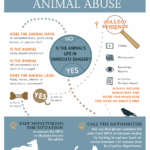Animal welfare has increasingly become a focal point in both societal and legal discussions in the United States. As our relationship with pets evolves, so do the laws and perceptions surrounding their treatment. While many pet owners regard their animals as beloved members of the family, an unsettling inquiry emerges: Is slapping your pet illegal in the U.S.? To answer this question, one must navigate the intricate web of animal cruelty laws, societal norms, and ethical considerations that govern the treatment of domestic animals.
First and foremost, it is essential to differentiate between physical discipline and outright abuse. The legal definitions of animal cruelty vary considerably from state to state. Generally, animal cruelty encompasses actions that cause unnecessary suffering or harm to animals. Therefore, understanding what constitutes physical abuse can help delineate the boundaries of lawful pet care.
In many jurisdictions, the term animal cruelty includes a spectrum of actions, ranging from neglect and abandonment to physical harm such as beating, hitting, or slapping. The pivotal question lies in the degree of severity associated with these actions. A light slap may not be categorized as abuse in some regions, but it raises significant ethical questions about the owner’s intent and the physical and emotional impact on the animal.
Animal cruelty laws are often categorized into two distinct types: active cruelty, which involves overt acts of violence against an animal, and passive cruelty, which pertains to neglect or failure to provide basic care. Slapping a pet straddles this line, particularly since it involves a conscious choice to inflict pain. Activists and animal welfare organizations consistently argue that any action causing distress to an animal, however slight, can lead to longer-term behavioral and psychological issues.
When examining case law, one can find various instances where courts have ruled on the legality of specific actions deemed abusive. For instance, some states have implemented “primary aggression” laws, designed to establish a baseline for what constitutes animal cruelty. In these cases, even minor instances of physical punishment could qualify as abuse if they lead to psychological damage or distress in animals over time.
Interestingly, the legal framework for pet treatment continues to evolve. As society becomes more attuned to the needs and feelings of animals, new legislation emerges to bolster protections. Several states have enacted laws that explicitly prohibit animal cruelty in all its forms, meaning that even a light slap could attract legal consequences. For example, California’s animal welfare laws encompass a broad range of behaviors deemed harmful to animals, ensuring proactive standards of care.
Furthermore, the implications of slapping your pet extend beyond just legal ramifications; they penetrate the deeper psychological facets of animal care. Animals, much like humans, respond to aversive stimuli with stress and anxiety. Research has consistently shown that animals subjected to any form of physical reprimand suffer from heightened fear responses, leading to behavioral issues such as aggression, anxiety, and withdrawal. Thus, what may seem like a minor action on the part of the pet owner can produce disproportionately severe consequences in the pet’s wellbeing.
Some advocates argue for more humane discipline techniques, such as positive reinforcement, which fosters a cooperative relationship between pet and owner without resorting to physical corrections. This approach not only ensures compliance but also nurtures trust and loyalty. In contrast, the act of slapping can erode this foundation and replace it with fear.
In light of the evolving understanding of animal sentience, many animal welfare organizations argue that any form of physical punishment should be abandoned. They work tirelessly to promote education and awareness about suitable pet training methods, emphasizing that a harmonious bond is built through respect and non-violent communication rather than intimidation.
Moreover, public sentiment has shifted significantly in recent years regarding pet ownership responsibilities. The perception that animals are merely possessions or tools has gradually eroded, giving way to the understanding that they are sentient beings with feelings and emotions. People today are more inclined to see pets as companions who warrant respect and care, leading to broader acceptance of animal rights and welfare initiatives.
Pets often act as barometers of human emotion. They can sense their owner’s moods and respond accordingly. Slapping, even if perceived as a minor corrective action, can create lasting scars on a pet’s psyche. The implications of this behavior ripple through the animal’s emotional landscape, often resulting in mistrust toward its owner and a fractured bond. When considering whether it is legal to slap a pet, it is profound to also reflect on the deeper ethical and emotional considerations involved.
In summary, the legality of slapping your pet is rooted more deeply in the broader context of animal cruelty laws, societal expectations, and ethical treatment. While it may not universally be considered illegal, it certainly teeters on the edge of abuse and negates the progression the human-animal bond has undergone in recent years. Understanding the legal implications and the psychological damage that can ensue from such actions is crucial for responsible pet ownership. Ultimately, fostering an environment devoid of physical reprimand is essential for cultivating a loving, trusting relationship with our pets.






